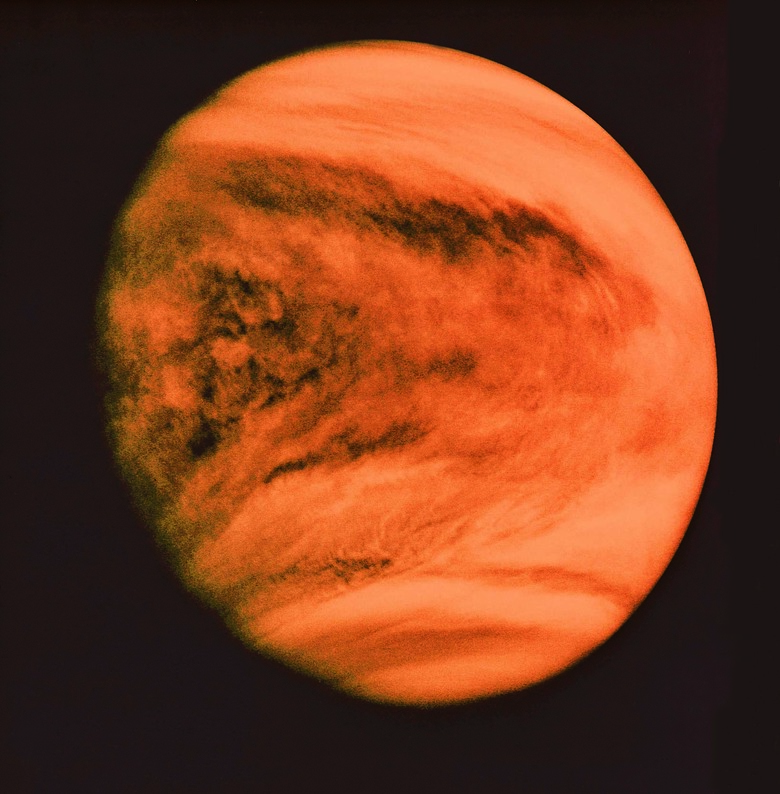Does It Rain On Planet Venus?
Planetary scientists sometimes point to the surface conditions on Venus as a warning of the dangers of global warming. The atmosphere is composed almost entirely of carbon dioxide — a greenhouse gas — and the surface temperature is a torrid 484 degrees Celsius (903 degrees Fahrenheit). Besides carbon dioxide, the atmosphere contains trace amounts of carbon monoxide and sulfuric acid. The latter frequently falls as rain, although it doesn't reach the ground.
Earth's Sister Planet
Earth's Sister Planet
Until they got a close look at Venus, planetary scientists considered it a sister planet to Earth, mainly because of its similar size and composition. After sending twenty spacecraft to that planet, however, beginning with Mariner 2 in 1962, they now realize that the two planets are very different, and one of the most important differences is that Venus does not have significant amounts of water. Scientists believe that this lack of water is responsible for the predominance of carbon dioxide in the atmosphere because, on Earth, water absorbs carbon dioxide.
No Place for a Vacation
No Place for a Vacation
The atmospheric pressure on Venus equals about 90 Earth atmospheres, or about the same as the pressure at a depth of 1 kilometer in Earth's oceans. Because the atmosphere is so dense, winds at the surface are slow, although they can be as fast as 217 mph (350 km/h) in the upper atmosphere. Because carbon dioxide is a greenhouse gas, the temperature at the surface is hotter than even that at the surface of Mercury, which is half the distance from the sun. Venus probably did have water, but it all boiled away in the intense heat.
Thunder, Rain and Lightning
Thunder, Rain and Lightning
The trace amounts of water in the upper atmosphere combine with sulfur dioxide to form clouds of sulfuric acid that cause frequent rainstorms. The acid rain evaporates long before it reaches the surface of the planet, however, and the vapors rise into the atmosphere to create more rain and continue the cycle. Scientists once believed that there were frequent lightning storms on Venus, but the Cassini-Huygens probe was unable to detect any during its two fly-bys on the way to Saturn. They attribute this lack to the fact that the Venusian atmosphere circulates horizontally rather than vertically, as it does on Earth.
Volcanic Activity
Volcanic Activity
Scientists have been peering through the thick Venusian atmosphere since the flight of Mariner 2, but they got their first detailed ideas of the planet's surface from the Magellan Orbiter in 1992. It revealed a surface devoid of large craters — only a tenth of the expected amount exist — and the presence of volcanic rocks on 85 percent of the planet's surface. Both are indications of intense and ongoing volcanic activity, and observers of the planet's surface have counted over 1,600 major volcanoes. They do not erupt as do volcanoes on Earth, however, possibly owing to the lack of water vapor as an explosive element.
Cite This Article
MLA
Deziel, Chris. "Does It Rain On Planet Venus?" sciencing.com, https://www.sciencing.com/rain-planet-venus-3599/. 24 April 2017.
APA
Deziel, Chris. (2017, April 24). Does It Rain On Planet Venus?. sciencing.com. Retrieved from https://www.sciencing.com/rain-planet-venus-3599/
Chicago
Deziel, Chris. Does It Rain On Planet Venus? last modified March 24, 2022. https://www.sciencing.com/rain-planet-venus-3599/
